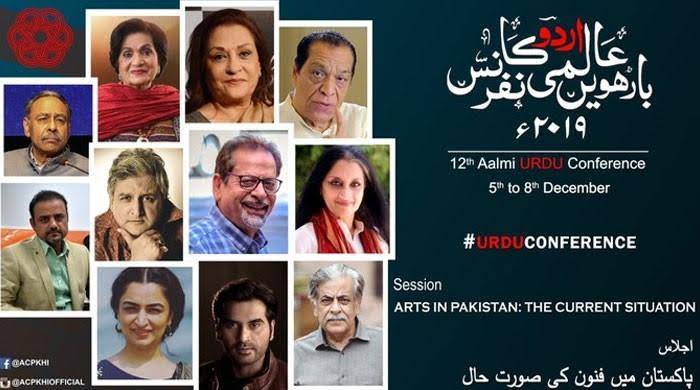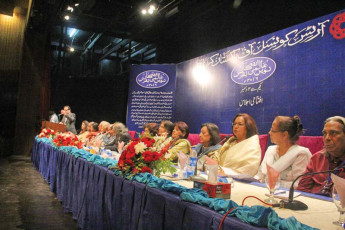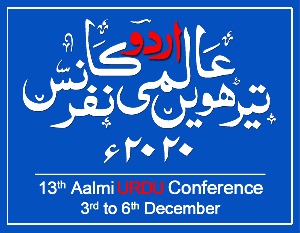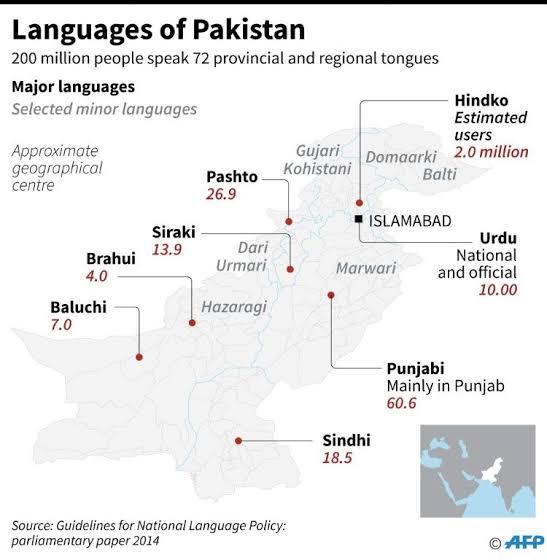
The 13th Aalmi Urdu Conference has commenced in Karachi from Thursday Dec 3 to continue till Dec 6. Significantly wider on scale although largely restricted to online by the exigencies of COVID–19, such a great annual gathering of those who serve Urdu language and literature is a sign that the intellectual class of our country is aware of national responsibilities and linguistic obligations and is impatient to solve the complex issues of language.

We welcome this conference and hope that the speakers and delegates will reflect very seriously upon solid realities rather than idle talk. They would construct some clear action which will further strengthen the foundations of national unity and security and fulfil our intellectual, spiritual and material requirements.
Very few people have complete knowledge on the philosophy of language and the science of linguistics, but to the extent of language at least four different schools of thought are found here. The first is the group which speaks and writes erroneous English, and perhaps is unaware even of English literature but has developed such a mentality in favour of customary control over the English language that let alone Urdu or regional languages, views all these with contempt and hatred. Despite being in a minority, this group has great influence.
 The second group comprises those people who consider Urdu a foreign language and want to develop regional languages. If English rather than Urdu remains on the throne, they find no harm in it since it is an international language. The third group consists of people who have great affection for Urdu but view regional languages with great contempt and hatred, in fact they do not consider them separate languages. If they had their way, they would terminate these languages altogether to impose Urdu upon everybody. Although they accept the international position and benefit of the English language, they still want to see Urdu as state and official language of the country side by side with English. Where there are so many diverse ideas about language, who can refuse the complexities and delicacies of this issue.
The second group comprises those people who consider Urdu a foreign language and want to develop regional languages. If English rather than Urdu remains on the throne, they find no harm in it since it is an international language. The third group consists of people who have great affection for Urdu but view regional languages with great contempt and hatred, in fact they do not consider them separate languages. If they had their way, they would terminate these languages altogether to impose Urdu upon everybody. Although they accept the international position and benefit of the English language, they still want to see Urdu as state and official language of the country side by side with English. Where there are so many diverse ideas about language, who can refuse the complexities and delicacies of this issue.

Although the Urdu language has abundant problems, but in our opinion, the basic issues are the following:
1. Making Urdu the state and official language instead of English.
2. Making Urdu the means of education in colleges and universities.
3. Introducing Urdu type and thinking about steps to do away with litho press.
4. Preparing scholarly and artistic literature in Urdu according to the demands of the modern times.
But before reflecting on these basic problems, we should accept some solid realities with the purity of heart, analyse and weigh the consequences of endorsing a particular linguistic perspective. We ought to consider:
1. Firstly that English is a global language. As an international language, Urdu can never take the place of English so while making the educational curriculum, we should not overlook English.
2. Urdu is not the language of any region of Pakistan nor it can become the mother tongue of people instead of some regional language.
3. The Urdu language is the sole source of expression and communication among the various regions of Pakistan. Punjabis, Sindhis, Balochis, Pakhtuns and Seraikis converse with each other very much in Urdu.
4. Speakers of regional languages read Urdu books very avidly. They write verses, short stories, essays and books in Urdu. Urdu is not an alien or foreign language for them. But one should not conclude from this that they will abandon their mother tongue to accept Urdu in its place.
5. Urdu has a great ability to accept words from other languages and it is a very flexible language.
6. Regional languages are not enemies or rivals of Urdu but are the branches of the very same family. Unity and cooperation within them is easily possible and without such cooperation, Urdu cannot attain the status and position which it deserves.
What should be the shape of cooperation between Urdu and other Pakistani languages; how should the words and idioms of these languages be entered into Urdu so that the stock of Urdu is enhanced and the people of every region imagine it to be their language; what should be the shape of introducing Urdu type and the harm which is accruing to Urdu due to litho; how should it be compensated; what should be the relationship between Urdu and mother tongues in primary and secondary education. The Conference will have to seriously think over these and countless questions of this nature.
As far as the problem of state and official language is concerned, so far it appears that all groups are in agreement; Urdu should be the state language in place of English. Although so far, the duration has not been fixed nor has any project for the interim period been made. We hope that the Aalmi Urdu Conference will also turn its attention towards this.

We welcome this conference and hope that the speakers and delegates will reflect very seriously upon solid realities rather than idle talk. They would construct some clear action which will further strengthen the foundations of national unity and security and fulfil our intellectual, spiritual and material requirements.
Very few people have complete knowledge on the philosophy of language and the science of linguistics, but to the extent of language at least four different schools of thought are found here. The first is the group which speaks and writes erroneous English, and perhaps is unaware even of English literature but has developed such a mentality in favour of customary control over the English language that let alone Urdu or regional languages, views all these with contempt and hatred. Despite being in a minority, this group has great influence.
 The second group comprises those people who consider Urdu a foreign language and want to develop regional languages. If English rather than Urdu remains on the throne, they find no harm in it since it is an international language. The third group consists of people who have great affection for Urdu but view regional languages with great contempt and hatred, in fact they do not consider them separate languages. If they had their way, they would terminate these languages altogether to impose Urdu upon everybody. Although they accept the international position and benefit of the English language, they still want to see Urdu as state and official language of the country side by side with English. Where there are so many diverse ideas about language, who can refuse the complexities and delicacies of this issue.
The second group comprises those people who consider Urdu a foreign language and want to develop regional languages. If English rather than Urdu remains on the throne, they find no harm in it since it is an international language. The third group consists of people who have great affection for Urdu but view regional languages with great contempt and hatred, in fact they do not consider them separate languages. If they had their way, they would terminate these languages altogether to impose Urdu upon everybody. Although they accept the international position and benefit of the English language, they still want to see Urdu as state and official language of the country side by side with English. Where there are so many diverse ideas about language, who can refuse the complexities and delicacies of this issue.
Although the Urdu language has abundant problems, but in our opinion, the basic issues are the following:
1. Making Urdu the state and official language instead of English.
2. Making Urdu the means of education in colleges and universities.
3. Introducing Urdu type and thinking about steps to do away with litho press.
4. Preparing scholarly and artistic literature in Urdu according to the demands of the modern times.
But before reflecting on these basic problems, we should accept some solid realities with the purity of heart, analyse and weigh the consequences of endorsing a particular linguistic perspective. We ought to consider:
1. Firstly that English is a global language. As an international language, Urdu can never take the place of English so while making the educational curriculum, we should not overlook English.
2. Urdu is not the language of any region of Pakistan nor it can become the mother tongue of people instead of some regional language.
3. The Urdu language is the sole source of expression and communication among the various regions of Pakistan. Punjabis, Sindhis, Balochis, Pakhtuns and Seraikis converse with each other very much in Urdu.
4. Speakers of regional languages read Urdu books very avidly. They write verses, short stories, essays and books in Urdu. Urdu is not an alien or foreign language for them. But one should not conclude from this that they will abandon their mother tongue to accept Urdu in its place.
5. Urdu has a great ability to accept words from other languages and it is a very flexible language.
6. Regional languages are not enemies or rivals of Urdu but are the branches of the very same family. Unity and cooperation within them is easily possible and without such cooperation, Urdu cannot attain the status and position which it deserves.
What should be the shape of cooperation between Urdu and other Pakistani languages; how should the words and idioms of these languages be entered into Urdu so that the stock of Urdu is enhanced and the people of every region imagine it to be their language; what should be the shape of introducing Urdu type and the harm which is accruing to Urdu due to litho; how should it be compensated; what should be the relationship between Urdu and mother tongues in primary and secondary education. The Conference will have to seriously think over these and countless questions of this nature.
As far as the problem of state and official language is concerned, so far it appears that all groups are in agreement; Urdu should be the state language in place of English. Although so far, the duration has not been fixed nor has any project for the interim period been made. We hope that the Aalmi Urdu Conference will also turn its attention towards this.
